He was a classic family doctor, in tune with every patient’s needs and quirks, and who took phone calls and made house visits at all hours of the night. And for many streaming through the cluttered offices of Dr. Moshe (Robert) Feldman, there was the added bonus of knowing that the kindly man peering down their throats and checking their ears had also served as a personal physician to the Rebbe—Rabbi Menachem M. Schneerson, of righteous memory—and his wife, Rebbetzin Chaya Mushka Schneerson, of righteous memory.
Feldman, who passed away on Dec. 1 (the eve of 28 Kislev), at the age of 80, remained active in his practice until the final days of his life, administering care and concern to patients of all ages.
Moshe Feldman was born in 1940 in Poughkeepsie, N.Y., where his father, Michael (Michel), owned a laundry business. Both of his parents were also musicians; his father played in a band, and his mother, Belle (Bayla), was a classical pianist who had played in Carnegie Hall.
The family was deeply traditional and steeped in Jewish culture, but not strictly mitzvah observant. Nevertheless, before going off to attend New York University, he promised his mother that he would only marry a Jewish girl. While in college, he noticed a young lady named Miriam Sherman—or Myra, as she was known at the time. True to his word, he did not consider dating her until he found out that she was Jewish. In fact, he would soon learn she was a practicing Orthodox Jew, born to a family of immigrants from Lithuania who clung tightly to Torah scholarship, devotion to mitzvah observance and Jewish values.
After Moshe willingly agreed to adopt a Torah lifestyle, the two announced their engagement in 1962. In the meantime, pursuing his dream of becoming a doctor, Moshe traveled to Nashville, Tenn., to attend the prestigious Meharry Medical College, a historically black medical school that had recently begun accepting white students.
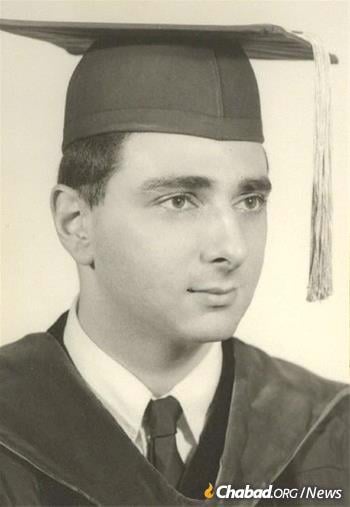
After the couple married in 1964 in Brooklyn, N.Y., they made their home in Nashville. While there, they became acquainted with Rabbi Zalman and Risya Posner, pioneering Chabad-Lubavitch emissaries who had led the city’s Jewish community since the 1940s.
For Miriam, Rabbi Posner was something new: He sported a beard like the European rabbis of her youth, but he spoke with the fluent English of a dyed-in-the-wool American.
For the Feldmans, the years in Nashville were ones of growth in more ways than one.
Studying Medicine and Torah
With the birth of their first two children, their family quickly grew. Their spirituality grew as well, as Miriam would study Torah with Risya and then transmit what she had learned to her husband, who devoted most of his waking hours to his medical studies. While she knew the mechanics of Jewish living from her mother and grandmother, this was her first time delving into Torah topics and learning the reasons for all the rituals she had formerly taken for granted.
“My father was completely on board,” recalls Sorah Shemtov, the couple’s eldest daughter. “As soon as he learned that something was the right thing to do, there were no questions and no second-guessing.”
After a brief stint at Kings County Hospital in Brooklyn, in 1968, Feldman’s career took him to Moody Air Force Base in Valdosta, Ga., where he served in the U.S. Air Force as a captain. In order for the couple to maintain their Jewish observance, they made monthly trips to Jacksonville, Fla., for kosher supplies and other amenities.
In 1970, they moved to the Bronx, N.Y., where their third child was born the day after their arrival, and where he completed his internship and residency at Albert Einstein and Jacobi hospitals.

Living in New York, they looked around for a Jewish kindergarten for their son. They found the local Lubavitcher yeshivah, which served children from across the dwindling Jewish community in the Bronx. Familiar with Lubavitch from their time with the Posners, they gladly enrolled their children.
Under the influence of Rabbi Mordechai and Rachel Altein, the couple became more acquainted with the teachings of Chabad and began spending Shabbat in the Crown Heights neighborhood of Brooklyn. Often staying with the families of the teachers in the Bronx yeshivah, they attended the Rebbe’s gatherings and participated in neighborhood Torah classes.
As the family transitioned to Chassidic life, they were greatly assisted by the late Rabbi Levi Yitzchak Schapiro, a teacher at the Bronx yeshivah who became a dear friend and mentor. They spent their summers in the Kol Tuv bungalow colony in Upstate New York, where they got to know many Chassidic families with whom they became fast friends.
Having specialized in pediatric cardiology, the young doctor was poised to pursue a career in that field. But after he examined a child as a favor to a friend, word got out about his exceptional bedside manner, attention to detail and methodical devotion. One thing led to another, and he soon found himself at the center of a burgeoning general practice based out of their Bronx home.
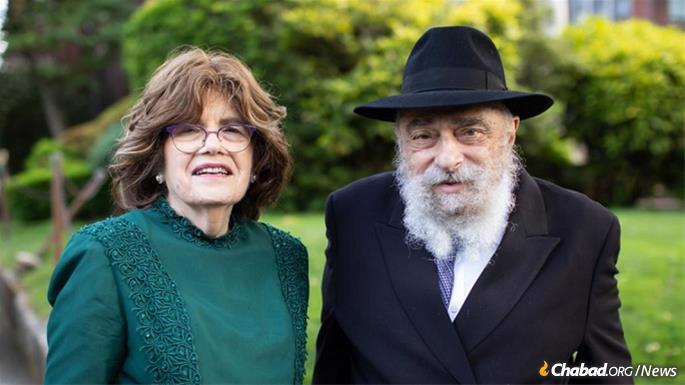
Emergency Treatment After the Rebbe’s Heart Attack
Looking ahead towards the time their eldest son would attend high school, they wrote to the Rebbe, requesting his blessing to relocate to Crown Heights, but the Rebbe did not agree to their request.
For the High Holidays and Sukkot of 1977, the family was in Brooklyn, basking in the uplifting atmosphere in the Rebbe’s court centered at 770 Eastern Parkway.
It was then, during the Shemini Atzeret Hakafot, that the Rebbe suffered a massive heart attack. Almost immediately, the cavernous synagogue emptied of people and the windows were shattered in an effort to bring fresh air to the Rebbe.
Finding his wife and daughter outside on Eastern Parkway, Feldman sent his boys to their mother and ran to get his medical equipment before going to see if he could offer assistance.
Once inside, he discovered that the Rebbe was adamant that he did not want to leave his study adjacent to the synagogue, noting that it was the place where people confided their worries in him and where he blessed and prayed for them.
Together with other, like-minded doctors, Feldman quickly worked to marshal resources to help convert the Rebbe’s wood-paneled booklined office into an advanced coronary care unit with advanced monitoring devices and other equipment.
Days in the Bronx, Nights in Brooklyn
Feldman’s family would not see him again until days later. From that point on, he became a member of the inner circle of the Rebbe and Rebbetzin, both of whom he would come to treat on a regular basis.
For the next several months, he spent every day at his Bronx practice and the nights at the Rebbe’s bedside, leaving every morning after giving the Rebbetzin her daily update.
“Whenever I came home and saw my parents whispering in a certain way, I knew that he had just gone or was about to go to the Rebbe or the Rebbetzin,” says Shemtov. “It didn’t matter what he was doing; if he got a call from the Rebbe’s staff, he was out the door in seconds.”
The family again requested the Rebbe’s blessing to move to Brooklyn and were gratified to receive the Rebbe’s encouragement.
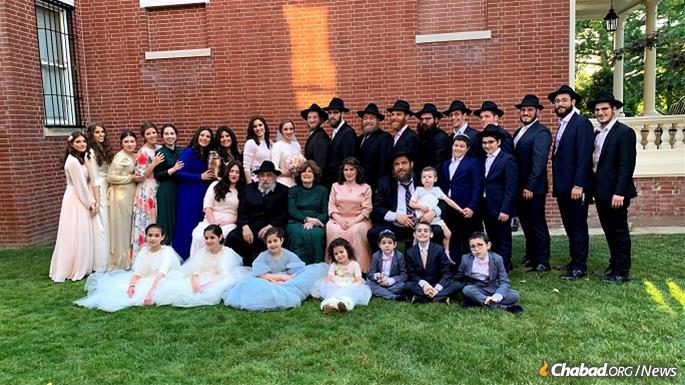
Feldman, however, continued to commute daily to the Bronx until he was able to sell his practice to a doctor he was confident would give the same level of care and devotion that he did.
Again, as in the Bronx, a home practice soon sprang up, and families from all over the neighborhood and beyond began to develop relationships with “the Rebbe’s doctor,” which would soon span generations.
Blessed with four children and wishing for another, Mrs. Feldman asked the Rebbe for a blessing. The Rebbe responded that she should teach Torah. She began teaching Torah to the residents of the nursing home where her husband served as medical director and soon discovered that she was pregnant.
The baby, Rivky (Nussbaum), who was born in 1983, became a playmate of the Rebbetzin. On Friday afternoons and again that evening after candle-lighting, Feldman would take the toddler to visit the Rebbetzin, whom she referred to as doda, Hebrew for “aunty.” On Friday afternoon, the pair would read children’s books together, and on Friday night, the Rebbetzin would give her candies, one of which she’d enjoy on the spot, depositing the rest for safekeeping until after Shabbat.
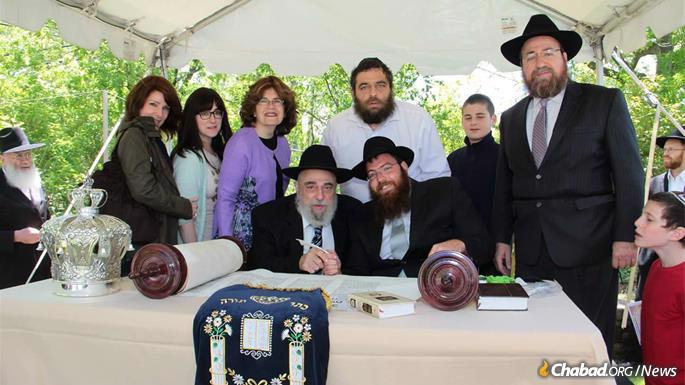
Joy and Sorrow
Shemtov recalls that she was about to become engaged to her husband, Rabbi Levi Shemtov, a scion of a well-known Chabad family. That Friday night, on the family’s weekly visit to the Rebbetzin, she shared the good news with the Rebbetzin, who had been giving her dating advice all along.
“Now I’m very happy,” said the Rebbetzin, “because now I know you’ll speak to your children in Yiddish.”
Twelve days later, the Rebbetzin was hospitalized and passed away. Feldman was the one who broke the shattering news to the Rebbe.
After shiva—the seven days of mourning—the Rebbe urged the family to celebrate the engagement in an especially joyous manner, specifying that real dishes be used and that live music be played.
Recognizing how much Feldman had improved his wife’s quality of life, at times running out to administer medication every four hours, the Rebbe remarked to him, “I am forever indebted for what you have done.”
When the Rebbe began receiving thousands of visitors every Sunday, giving each one a dollar for charity and a blessing, Mrs. Feldman was on hand to assist, ensuring that everything proceeded in an orderly fashion. After the crowd had gone, the Rebbe would give her a dollar and then hand her an additional bill “for your husband, for all his patients, including me.”
The Rebbe would use a similar term to the doctor as well, evoking the special relationship they had on numerous occasions.

Even though Feldman had a degree of access to the Rebbe far beyond that of most other Chassidim, he always remained humble—never feeling himself better than or above anyone else. At the same time, he treasured the trust that had been invested in him, rarely sharing details of his revered patients, even with close family members.
At more than one point, he considered scaling back his medical practice in favor of part-time business. The Rebbe strongly discouraged him to do so, telling him that healing was his life’s calling, in which he had found success.
Indeed, he continued to see patients deep into his 81st year, even after suffering the loss of his wife and eldest son during the coronavirus pandemic.
After a celebration on the first night of Chanukah in Riverdale, where the Shemtovs are Chabad emissaries, he returned home and returned calls from his patients. That night, he began to feel pain, which doctors, including his own son, could not explain.
Three days later, he passed away, two days shy of his 81st birthday.
Predeceased by his wife and eldest son, Yitzchok Gedaliah Feldman, the doctor was survived by his children: Sorah Shemtov, Riverdale, N.Y.; Rabbi Dr. Dovid Feldman, Brooklyn, N.Y.; Rabbi Chanan Feldman, Brooklyn, N.Y.; and Rivky Nussbaum, Monsey, N.Y.; in addition to grandchildren and great-grandchildren. He was also survived by his sister, Rona (Rochel) Wiatrak.

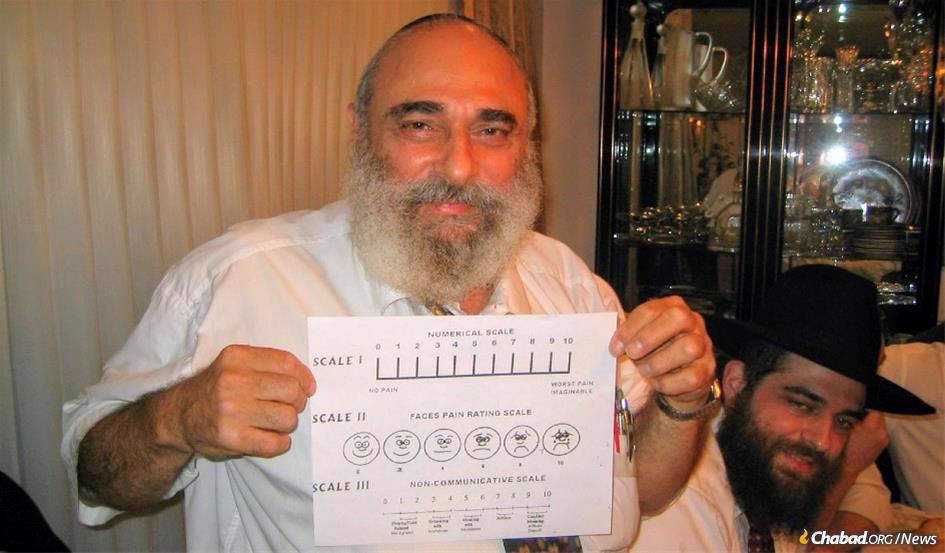




Join the Discussion